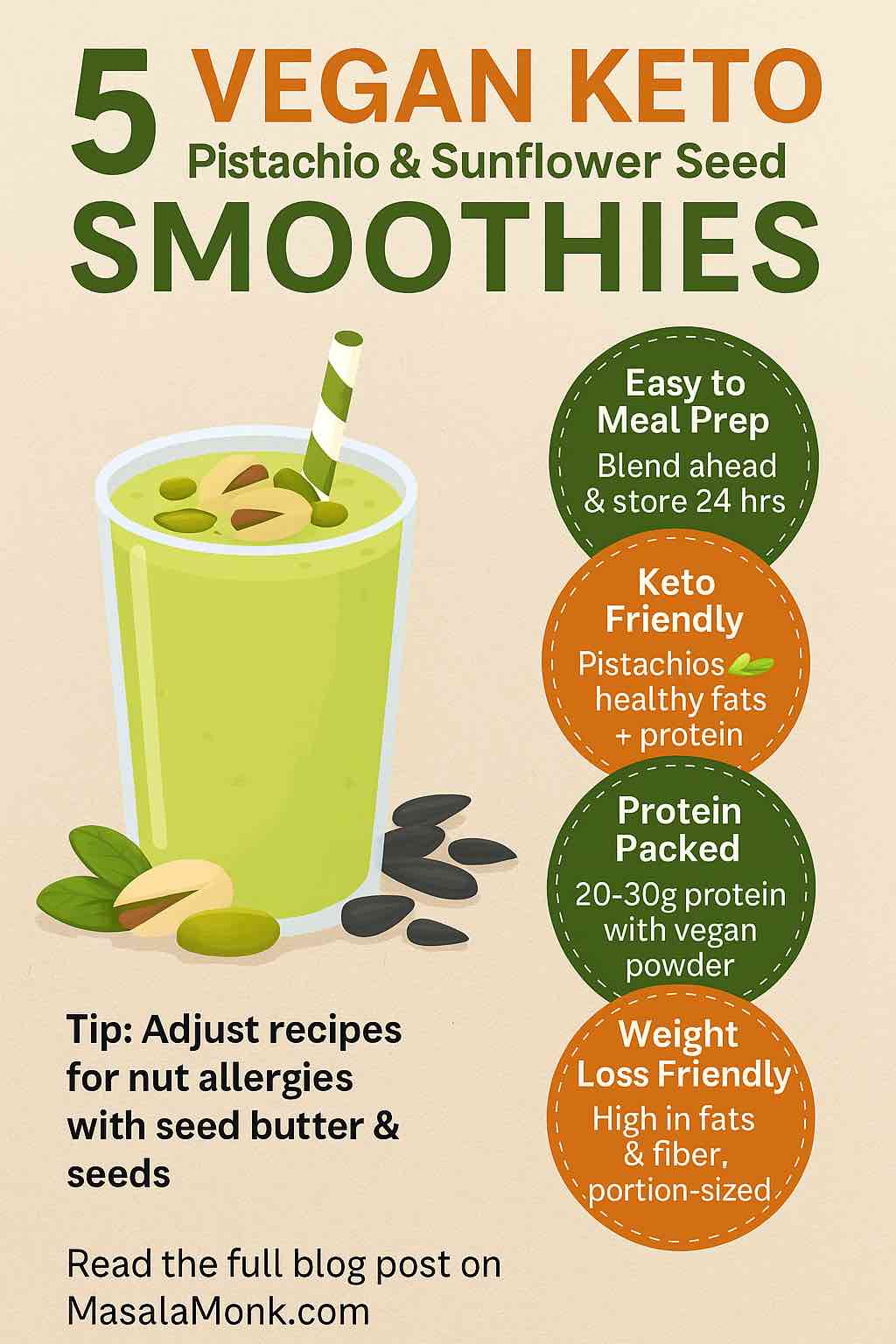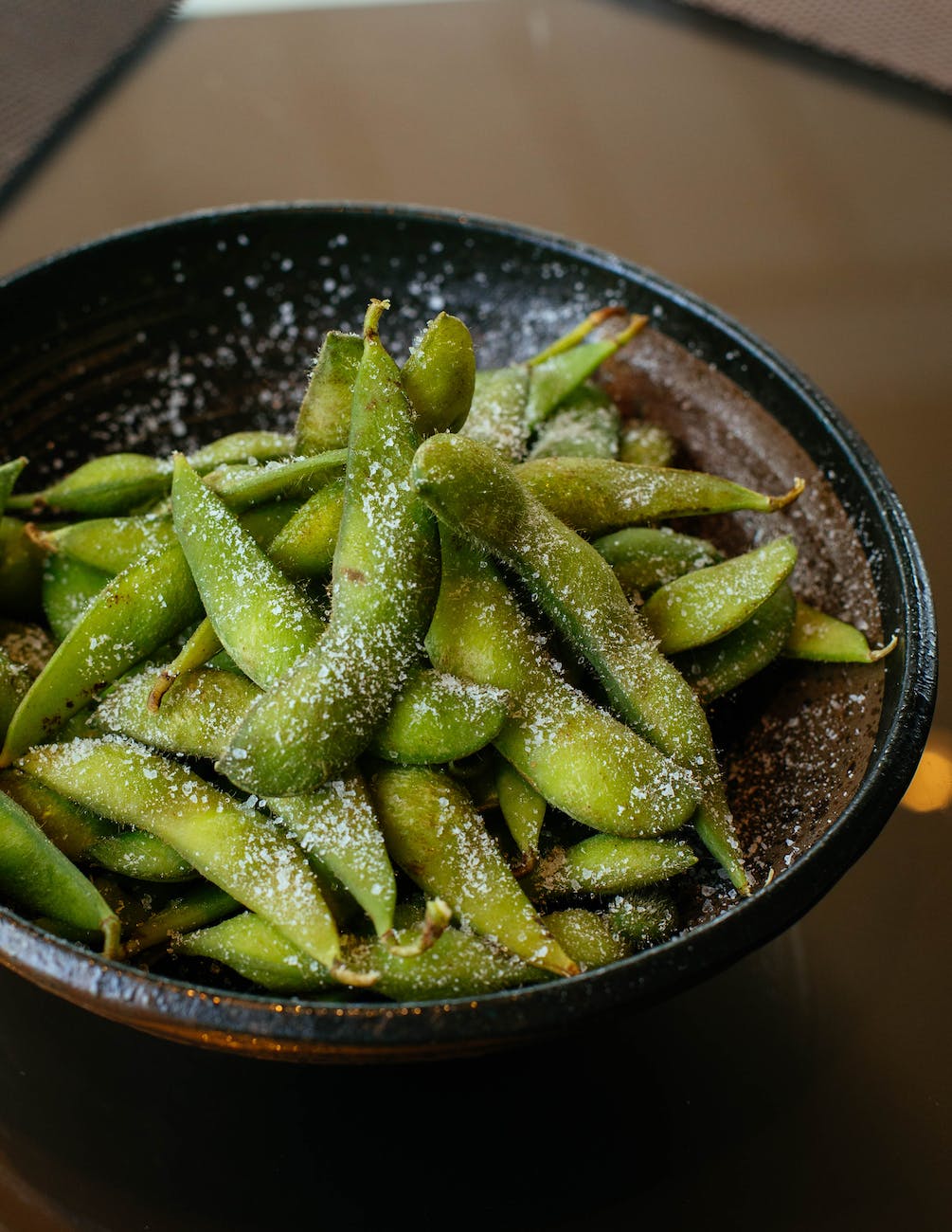
When you’re navigating a vegan keto lifestyle, breakfast can feel like a tricky puzzle: you want something quick, nutrient-dense, low in carbs, but still satisfying. Enter the ultimate solution: pistachio and sunflower seed smoothies. These nutrient-packed ingredients deliver a powerhouse of healthy fats, protein, and fiber without tipping the carb scale. Let’s explore five creative and practical smoothie recipes designed specifically for meal replacement on a vegan keto diet.
Why Pistachios and Sunflower Seeds?
Both ingredients are often underestimated in the smoothie world but shine on a vegan keto plan:
- Pistachios are rich in monounsaturated fats, magnesium, vitamin B6, and even provide a complete source of protein.
- Sunflower seeds offer vitamin E, selenium, and a solid profile of healthy fats and fiber.
Together, they form the perfect base for creamy, satiating, and nutrient-balanced smoothies.
Smoothie 1: Green Pistachio Crunch
Ingredients:
- 1/4 cup raw pistachios (soaked for 10 minutes)
- 2 tbsp raw sunflower seeds
- 1 cup unsweetened almond or coconut milk
- 1 handful spinach
- 1 tbsp chia seeds
- Ice cubes
Directions: Blend all ingredients until smooth. For a little texture, pulse in a few extra sunflower seeds at the end.
Why it Works: This recipe delivers a perfect trio of fats, fiber, and protein, and the spinach adds micronutrients without altering the taste.
Smoothie 2: Pistachio-Matcha Mint Refresh
Ingredients:
- 1/4 cup pistachio butter
- 1 tsp ceremonial matcha
- A few fresh mint leaves
- 1 scoop vegan vanilla protein powder
- 1 tbsp hemp seeds
- 1 cup unsweetened oat or almond milk
- Ice cubes
Directions: Blend until creamy and bright. Garnish with a mint sprig for a refreshing morning kick.
Why it Works: Matcha boosts metabolism and focus, while mint aids digestion. Hemp seeds add extra protein and omega-3s.
Smoothie 3: Chocolate Sunflower Power
Ingredients:
- 2 tbsp sunflower seed butter
- 1 tbsp unsweetened cocoa powder
- 1 cup coconut milk + 1/2 cup water
- 1 scoop vegan chocolate protein powder (optional)
- 1/2 tsp vanilla extract
- Ice cubes
Directions: Blend until rich and smooth. For a mocha version, add a shot of espresso.
Why it Works: This dessert-like smoothie satisfies chocolate cravings while keeping carbs in check.
Smoothie 4: Banana-Free Pistachio Protein Shake
Ingredients:
- 1 cup unsweetened almond or pistachio milk
- 1 tbsp pistachio butter
- 1 scoop vegan protein powder
- 1/2 avocado (for texture)
- Ice cubes
Directions: Blend until smooth and creamy. Top with crushed pistachios for a crunchy finish.
Why it Works: No banana means minimal carbs. Avocado enhances the texture and adds healthy fats.
Smoothie 5: Pistachio Meal Replacement Shake
Ingredients:
- 40g soaked pistachios
- 2 tbsp raw sunflower seeds
- 1 tbsp ground flaxseed
- 1 scoop hemp or soy protein
- 250ml unsweetened almond or oat milk
- 1/2 tsp cinnamon
- 1 tsp vanilla extract
- Ice cubes
Directions: Blend thoroughly until creamy. Optionally add a pinch of salt for balance.
Why it Works: This one is tailored for full meal replacement: high in fats, protein, and fiber to keep you full for hours.
Pro Tips for Smoothie Success
- Keep it Cold: Use frozen avocado or cauliflower for added creaminess without diluting flavor.
- Batch It: Prep 2-3 servings in advance and store in sealed jars for grab-and-go nutrition.
- Customize the Boosters: Add MCT oil for brain fuel, or swap in different greens for variety.
- Watch the Carbs: Skip high-sugar fruits and keep total net carbs under 10g per shake.
Final Thoughts
Innovating your vegan keto breakfast doesn’t require exotic ingredients or hours in the kitchen. With pistachios and sunflower seeds as your foundation, you can craft creamy, satisfying smoothies that not only meet your macros but genuinely excite your taste buds. Try rotating these recipes throughout your week to stay energized and in ketosis, without ever getting bored.
✅ FAQs
- Are pistachios and sunflower seeds keto-friendly?
Yes, in moderation. Pistachios and sunflower seeds are high in healthy fats and protein with moderate carbs. Keeping portions controlled (e.g., ¼ cup pistachios) makes them keto-compliant. - Can I prepare these smoothies in advance?
Absolutely. You can prep and store smoothies in airtight containers in the fridge for up to 24–36 hours. Shake well before consuming. - How much protein is in each smoothie?
With the inclusion of vegan protein powder, most recipes deliver 20–30g of protein per serving. Without powder, expect 8–15g, depending on the seed/nut base. - What milk alternatives work best for these recipes?
Unsweetened almond, coconut, and pea milk are best for keto. They’re low in carbs, rich in flavor, and blend smoothly. - Can I skip protein powder and still get enough protein?
Yes, but you’ll need to rely more on hemp seeds, chia, pistachios, and sunflower seed butter. Protein will be lower but still decent for a meal. - Are these smoothies suitable for weight loss?
Yes—when portioned appropriately. They’re high in satiety-promoting fats, fiber, and protein, helping manage hunger and blood sugar. - What can I use instead of avocado in the banana-free shake?
Frozen cauliflower, coconut cream, or extra nut butter can replicate the creamy texture without adding sugar. - Do these smoothies break a fast?
Yes. Because they contain calories, fats, and protein, they break a fast—but they make a great first meal post-fasting. - Can I freeze these smoothies?
Technically yes, but texture may degrade slightly after thawing. For best results, freeze ingredients in portions and blend fresh. - How can I adjust the recipes for nut allergies?
Use seed-based alternatives like sunflower or pumpkin seed butter, and opt for oat or coconut milk instead of nut milks.










